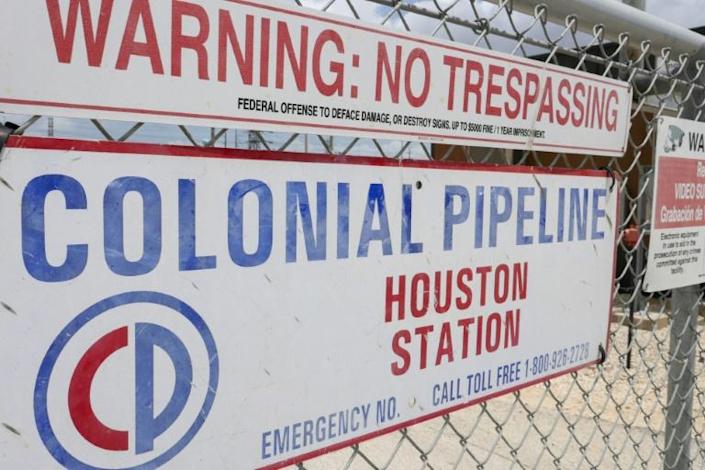United States
美国版块
Hacking and ransoms
黑客攻击与勒索
Post-Colonial studies
Colonial Pipeline遭受勒索攻击事件的复盘
A cyber-attack exposes growing risks to America’s energy infrastructure
一次网络攻击事件暴露出美国能源基础设施所面临的与日俱增的风险
Pipelines, like cables and substations, are the type of dull, critical infrastructure that Americans don’t think about until, suddenly, they must. On May 7th a cyber-attack prompted Colonial Pipeline, a firm headquartered in Georgia, to shut down a tube stretching from Texas to New Jersey that supplies about 45% of the petrol and diesel used on the east coast. Federal officials confirmed that DarkSide, a ransomware gang believed to be based in the former Soviet Union, was responsible. "We're not talking about some small pipeline,” explains Amy Myers Jaffe, author of “Energy’s Digital Future”, a new book. "We’re talking about the jugular.”
就像电缆和变电站一样,管道是一种不起眼却必不可少的基础设施,美国人若非突然必要,通常不会将管道放在心上。5月7日,总部位于佐治亚州的Colonial Pipeline公司因一次网络攻击而被迫关闭了从德克萨斯州到新泽西州的输油管道,该管道承担着东海岸45%的汽油和柴油供应。联邦官员证实,此次网络攻击的幕后黑手是据信前苏联的勒索组织DarkSide。新书《能源的数字未来》的作者艾米·迈尔斯·贾菲解释说:“我们谈及的可不是什么小管道,而是美国的要害。”
On May 12th Colonial Pipeline said it had “initiated the restart of pipeline operations”, a carefully worded statement that conveys both the difficulty of returning to normal and a desire to contain panic. That day average petrol prices topped $3 a gallon for the first time since 2014. Much depends on whether more drivers rush to buy petrol, as they did in the oil shocks of the 1970s. If 30m carowners with half a tank decide to fill up, reckons S&P Global Platts Analytics, a data group, they would guzzle over 4m barrels, more than the recent daily demand of the entire eastern seaboard. Many are already buying while they can. Long queues formed at petrol stations in the south-east on May 11th. Some stations limited purchases; others ran out of fuel. The White House said it had established “an inter-agency response group” to “ ensure a continuing flow of fuel”.
5月12日,Colonial Pipeline公司称已经“开始重启管道运营”,这一措辞谨慎的声明既表达了恢复正常的难度,也表达了其遏制恐慌的愿望。当天,汽油平均价格自2014年以来首次突破每加仑3美元。汽油价格在很大程度上取决于是否有更多的司机像上世纪70年代石油危机时那样急于购买汽油。数据集团标准普尔全球普拉茨分析公司估计,如果3000万名拥有半箱油的车主决定加满油,那将消耗400多万桶汽油,超过整个东海岸最近的每日需求量。很多人已经在尽可能购买汽油了。5月11日,美国东南部的加油站排起了长队。部分加油站限购汽油;其他加油站则全部卖光。白宫表示已成立了“跨机构应对小组”,以“确保燃料的持续供应”。

Even if supplies are restored quickly, however, America faces a more stubborn problem. Despite more than a decade of attention to cybersecurity, the country’s energy infrastructure—the pipelines, power generators and grids on which the economy depends—remains exposed to hackers. Indeed the energy system may yet become more vulnerable, not less.
不过,即使供应迅速恢复,美国也面临着一个更为棘手的问题。尽管人们十多年来一直关注网络安全,但美国的能源基础设施——经济赖以增长的输油管道、发电机和电网——仍然面临黑客的威胁。事实上,美国能源系统目前可能更易受到攻击,而并非不太脆弱。
Securing oil and electricity assets used to mean guarding against physical attacks: a bombing of a refinery, for instance. Those risks remain, but hackers can also inflict grave damage. In 2010 the Stuxnet worm, generally believed to have been deployed by Israel and America, targeted a nuclear facility in Iran. In 2015 and 2016 Russian hackers caused blackouts in Ukraine.
确保石油和电力资产安全在过去意味着防范物理攻击:例如,轰炸炼油厂。物理风险仍然存在,但黑客也可能造成严重损害。2010年,通常被认为是以色列和美国部署的Stuxnet蠕虫病毒攻击了一个伊朗核设施。2015年和2016年,俄罗斯黑客攻击乌克兰,造成断电。
Aware of such risks, American executives and politicians have tried to mitigate them. The American Petroleum Institute, the country’s main oil lobby, has held an annual conference on cybersecurity since 2006. The Department of Energy dutifully developed “The Energy Sector Specific Plan” for cyberthreats, in 2015, “The Multi-year Plan for Energy Sector Cybersecurity”, in 2018 and “The 2020 Cybersecurity Multi-year Program Plan”, to name but a few.
美国高管和政客们在意识到黑客攻击的风险后试图降低风险。美国主要的石油游说团体美国石油协会自2006年以来每年都举办一次网络安全会议。美国能源部尽职尽责地在2015年制定了针对网络威胁的《能源部专项预案》,2018年制定了《能源部网络安全多年计划》,还有《2020年网络安全多年计划》等等。
译文由可可原创,仅供学习交流使用,未经许可请勿转载。












